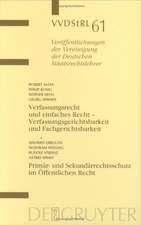The Constitution of Germany: A Contextual Analysis: Constitutional Systems of the World
Autor Werner Heunen Limba Engleză Paperback – 29 noi 2010
Din seria Constitutional Systems of the World
- 13%
 Preț: 174.07 lei
Preț: 174.07 lei - 38%
 Preț: 134.64 lei
Preț: 134.64 lei - 23%
 Preț: 197.68 lei
Preț: 197.68 lei - 14%
 Preț: 147.59 lei
Preț: 147.59 lei - 34%
 Preț: 509.52 lei
Preț: 509.52 lei - 28%
 Preț: 374.41 lei
Preț: 374.41 lei - 40%
 Preț: 466.81 lei
Preț: 466.81 lei - 22%
 Preț: 263.72 lei
Preț: 263.72 lei - 23%
 Preț: 185.93 lei
Preț: 185.93 lei - 19%
 Preț: 166.82 lei
Preț: 166.82 lei - 23%
 Preț: 152.82 lei
Preț: 152.82 lei - 21%
 Preț: 218.26 lei
Preț: 218.26 lei - 23%
 Preț: 178.47 lei
Preț: 178.47 lei - 19%
 Preț: 303.62 lei
Preț: 303.62 lei - 18%
 Preț: 300.14 lei
Preț: 300.14 lei - 30%
 Preț: 510.03 lei
Preț: 510.03 lei - 14%
 Preț: 192.30 lei
Preț: 192.30 lei - 18%
 Preț: 304.66 lei
Preț: 304.66 lei - 23%
 Preț: 178.02 lei
Preț: 178.02 lei - 18%
 Preț: 225.31 lei
Preț: 225.31 lei - 23%
 Preț: 197.14 lei
Preț: 197.14 lei - 18%
 Preț: 180.44 lei
Preț: 180.44 lei - 18%
 Preț: 179.98 lei
Preț: 179.98 lei - 18%
 Preț: 186.35 lei
Preț: 186.35 lei - 16%
 Preț: 218.47 lei
Preț: 218.47 lei - 19%
 Preț: 184.14 lei
Preț: 184.14 lei - 18%
 Preț: 297.58 lei
Preț: 297.58 lei - 16%
 Preț: 218.00 lei
Preț: 218.00 lei - 18%
 Preț: 232.54 lei
Preț: 232.54 lei - 23%
 Preț: 171.85 lei
Preț: 171.85 lei - 18%
 Preț: 225.49 lei
Preț: 225.49 lei - 14%
 Preț: 185.93 lei
Preț: 185.93 lei - 13%
 Preț: 230.79 lei
Preț: 230.79 lei - 13%
 Preț: 186.10 lei
Preț: 186.10 lei - 19%
 Preț: 179.10 lei
Preț: 179.10 lei -
 Preț: 223.20 lei
Preț: 223.20 lei - 18%
 Preț: 180.44 lei
Preț: 180.44 lei -
 Preț: 217.09 lei
Preț: 217.09 lei - 18%
 Preț: 186.35 lei
Preț: 186.35 lei
Preț: 179.00 lei
Preț vechi: 207.21 lei
-14% Nou
Puncte Express: 269
Preț estimativ în valută:
34.26€ • 35.63$ • 28.28£
34.26€ • 35.63$ • 28.28£
Carte tipărită la comandă
Livrare economică 14-28 aprilie
Preluare comenzi: 021 569.72.76
Specificații
ISBN-13: 9781841138688
ISBN-10: 1841138681
Pagini: 276
Ilustrații: black & white illustrations
Dimensiuni: 138 x 216 x 14 mm
Greutate: 0.36 kg
Editura: Bloomsbury Publishing
Colecția Hart Publishing
Seria Constitutional Systems of the World
Locul publicării:London, United Kingdom
ISBN-10: 1841138681
Pagini: 276
Ilustrații: black & white illustrations
Dimensiuni: 138 x 216 x 14 mm
Greutate: 0.36 kg
Editura: Bloomsbury Publishing
Colecția Hart Publishing
Seria Constitutional Systems of the World
Locul publicării:London, United Kingdom
Notă biografică
Werner Heun is Professor at the Law Faculty of the University of Göttingen and Director of the Institute for General Theory of State and Political Sciences.
Cuprins
1. Introduction: Some Peculiarities of German Constitutional Law and Jurisprudence 2. The Rise of Constitutionalism in Germany-Traditions and Concepts 3. The Fundamental Principles of the Constitution and Democratic Legitimacy Part I Foundations Part II The Democratic Principle Part III The Rechtsstaat Principle Part IV The Social State Principle Part V Republican Form of Government Part VI Federalism as Fundamental Principle Conclusion 4. The Federal System Part I Foundations Part II The Constitutional Principles of Federalism Part III Structure of Functions and Competences in German Federalism Part IV From Dual to Cooperative Federalism and Beyond Part V Federalism within a Multilevel Structure of Government Conclusion 5. Separation of Powers and Parliamentary Government Part I Separation of Powers as a Constitutional Principle Part II The People Part III The Political Parties as a Link between State and Society Part IV The Bundestag-The German Parliament Part V Parliamentary Government Conclusion 6. Government and Administration Part I Cabinet and Federal Government Part II The Federal President Part III Administration Part IV The Military Conclusion 7. The Constitutional Role of the Judiciary and the Constitutional Court Part I The Courts Part II The Constitutional Court Conclusion 8. The System of Fundamental Rights 9. Epilogue
Recenzii
Overall, The Constitution of Germany is well researched and provides the reader with a wealth of information about the Basic Law.
Descriere
This book is a detailed contextual examination of the constitution of Germany including its history.
















